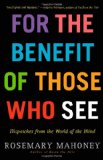Summary | Excerpt | Reviews | Beyond the Book | Readalikes | Genres & Themes | Author Bio

Dispatches from the World of the Blind
by Rosemary Mahoney
Aias came out of the surgery with hard transparent plastic protective covers taped over his eyes and moving a bit unsteadily at the side of the surgeon. I hooked his arm through mine and led him across the waiting room, in which that day there sat a preponderance of Hasidic
*Years later, when I read in Leonardo da Vinci's Paragone that a man who had lost his sight was like "a man shut alive inside a tomb where he could live and move," I thought that if he had only removed the second clause, his description would have been dead accurate.
women. Some wore heavy loaflike wigs that gave them an armored appearance, and those wigged women who had bandages on their eyes looked particularly baleful. As we moved toward the door, the surgeon gave me a startling nudge in the ribs with his elbow. "What about you?" he said. "You want the surgery?"
I laughed with false agreeability and nodded in a way that meant Oh, sure! Good idea! Thanks for thinking of me while in my heart I was thinking, Fat fucking chance. You wouldn't catch me dead submitting my eyes to that knife.
For a while Aias had been encouraging me to have the surgery. He hated it when I reached for my eyeglasses, hated the way they looked on me. But even though it was true that at age forty-nine, I found my eyes rapidly weakening, I was adamantly set against laser eye surgery. I couldn't read a thing now without magnifying lenses, not unless I squinted severely and held the text as far away from my face as my arms would allow. I often heard myself muttering with ornate irritation, "I cannot see a thing anymore." And yet I would rather be dependent on eyeglasses and the annoyances of losing them, sitting on them, endlessly wiping fingerprints from them, replacing the loose screws on them, rummaging constantly in my bag for them or thrashing my way through the house in search of them when in fact they are sitting atop my head the whole time, silently mocking me—I would rather endure all those minor annoyances than surrender my eyes to anybody or anything over which I could not have complete control.
The surgeon said his unsmiling good-byes and admonished Aias not to exert himself unduly for the next forty-eight hours. We took a taxi back to our hotel, where Aias lay on the bed, head propped up on three pillows, hands by his sides, nose and toes pointing at the ceiling. With the bulbous protective cups over his eyes, he looked somehow incarcerated, detained. In an hour or so I was to remove the coverings and put medicinal drops in his eyes. It struck me as I looked at him lying there that being sightless was akin to being toothless. Self-defense and aggression both seemed to me difficult to achieve fully when you had no eyes or teeth. For a few seconds I imagined Aias toothless, his mouth caved in. Which would I prefer him to be: toothless or blind? Toothless looked bad, but then some kinds of blindness did too. Toothless was a condition that could be remedied with a bit of expert dentistry, whereas in most cases blindness could not be remedied by anything at all.* I sincerely hoped that Aias was not blind. Soon enough, when I administered the eyedrops, we would have the answer.
I went to the window and looked out. I could see Jerusalem's old cemetery on the hill to the north. The stones of the tombs gave off a parched, senile yellow light and looked, from this distance, for all the world like the rubble of a ruin. A phalanx of stiff-spined cypress trees stood at the edge of the cemetery as cars crept by on the avenue below it—Israelis going about their business while the skeletons above them lay motionless in their tombs, a silent reminder of what was ahead for all of us.
Bored, I lay down on the bed next to Aias and held his hand. I knew he disliked being idle and debilitated. But he was a patient person, far more patient than I. Had I been in his position I would have been restlessly bad-tempered, complaining bitterly, and emitting dark vocal sighs of despair every sixty seconds or so. Aias, however, was silent and relaxed, waiting for time to take its course. He could even smile at his predicament, showing his strong teeth. I smoothed his knuckles and fingers, put my arm over his chest, kissed his neck and ear. I admired
Excerpted from For the Benefit of Those Who See by Rosemary Mahoney. Copyright © 2014 by Rosemary Mahoney. Excerpted by permission of Little Brown & Company. All rights reserved. No part of this excerpt may be reproduced or reprinted without permission in writing from the publisher.
The moment we persuade a child, any child, to cross that threshold into a library, we've changed their lives ...
Click Here to find out who said this, as well as discovering other famous literary quotes!
Your guide toexceptional books
BookBrowse seeks out and recommends the best in contemporary fiction and nonfiction—books that not only engage and entertain but also deepen our understanding of ourselves and the world around us.